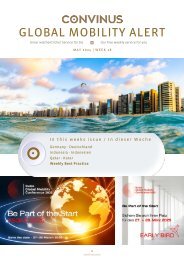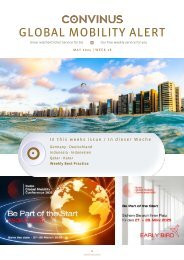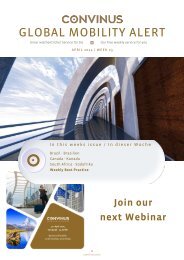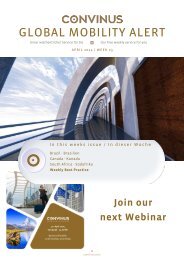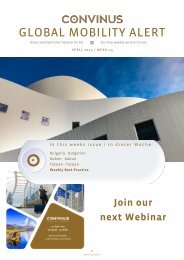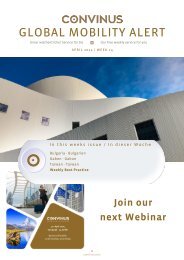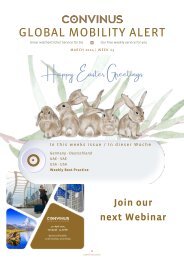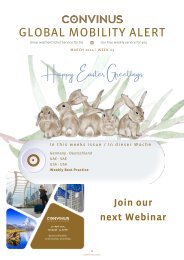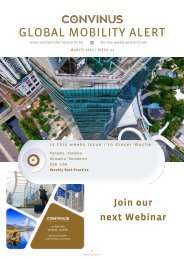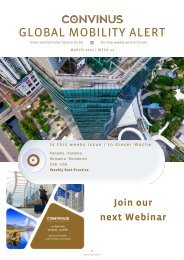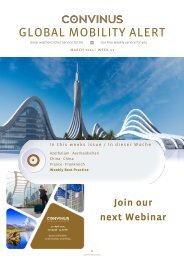CONVINUS Global Mobility Insights NEWSLETTER Herbst / Fall 2022
«Familiar expertise in a new look - the next generation of our popular CONVINUS newsletter is here! » To take the next steps, we have repackaged our popular newsletter and given it a modern layout. We cannot master the challenges in the Global Mobility sector alone, so we offer our great CONVINUS Global Network partners a special platform here. In each of our newsletters we will introduce you to some of them. The issues that concern you also concern us. For this reason, we are pleased to present the autumn issue 2022, with the following focus: «Remote Work / Digital Nomad / Home Office» • CONVINUS for the perspective from Switzerland • Globalization Partners for a global overview • Artus for the perspective from Austria • Corporate Relocations Greece for the perspective from Greece
«Familiar expertise in a new look - the next generation of our popular CONVINUS newsletter is here! »
To take the next steps, we have repackaged our popular newsletter and given it a modern layout. We cannot master the challenges in the Global Mobility sector alone, so we offer our great CONVINUS Global Network partners a special platform here. In each of our newsletters we will introduce you to some of them.
The issues that concern you also concern us. For this reason, we are pleased to present the autumn issue 2022, with the following focus: «Remote Work / Digital Nomad / Home Office»
• CONVINUS for the perspective from Switzerland
• Globalization Partners for a global overview
• Artus for the perspective from Austria
• Corporate Relocations Greece for the perspective from Greece
You also want an ePaper? Increase the reach of your titles
YUMPU automatically turns print PDFs into web optimized ePapers that Google loves.
<strong>Global</strong> <strong>Mobility</strong><br />
<strong>Insights</strong><br />
Newsletter<br />
<strong>Herbst</strong> / <strong>Fall</strong> <strong>2022</strong>
B I S Z U M 3 1 . D E Z E M B E R 2 0 2 2 B U C H E N & S P A R E N
convinus.com 3<br />
<strong>Global</strong> <strong>Mobility</strong> <strong>Insights</strong> - <strong>Herbst</strong> / <strong>Fall</strong> <strong>2022</strong><br />
Inhaltsverzeichnis / Table of content<br />
Seite 4-8:<br />
Remote Working in der Schweiz –<br />
ist das überhaupt möglich?<br />
Page 9-12:<br />
Remote working in Switzerland -<br />
is that even possible?<br />
Seite 13-17:<br />
Was Arbeitgeber über Remote<br />
Arbeitsvisa wissen müssen<br />
Page 18-20:<br />
What employers need to know<br />
about remote work visas<br />
Seite 21-24:<br />
Remote Working<br />
Page 25-28:<br />
Remote working<br />
Seite 29-32:<br />
Remote / Hybrid Work / Digitales<br />
Nomadenvisum in Griechenland<br />
Page 33-36:<br />
Remote / Hybrid Work / Digital<br />
nomad visa in Greece
Chagal ist Franzose und ist bei<br />
Peter<br />
Drinks AG in Frankreich angestellt.<br />
der<br />
möchte mit seiner Familie in die<br />
Er<br />
umziehen und weiterhin für<br />
Schweiz<br />
französische Drinks AG arbeiten.<br />
die<br />
Drinks AG hat keine Niederlassung<br />
Die<br />
Tochtergesellschaft in der<br />
oder<br />
Seine Tätigkeit als Social<br />
Schweiz.<br />
Verantwortlicher kann er von<br />
Media<br />
her ausüben.<br />
überall<br />
Arbeitgeber muss hierfür nun die<br />
Der<br />
bewilligungs-, sozialversicher-<br />
arbeits-,<br />
und steuerrechtlichen Aspekte<br />
ungs-<br />
die Payrollumsetzung prüfen.<br />
sowie<br />
der Prüfung bestätigt der<br />
Nach<br />
dass Herr Chagal in die<br />
Arbeitgeber,<br />
<strong>Global</strong> <strong>Mobility</strong> <strong>Insights</strong> - <strong>Herbst</strong> / <strong>Fall</strong> <strong>2022</strong><br />
Remote Working in der Schweiz – ist das überhaupt<br />
möglich?<br />
Autorin: Friederike V. Ruch, <strong>CONVINUS</strong> (Schweiz)<br />
Ausländische Unternehmen sind<br />
oftmals daran interessiert,<br />
Mitarbeiter in der Schweiz zu finden<br />
oder einzusetzen, ohne dass eine<br />
Tochtergesellschaft oder Niederlassung<br />
in der Schweiz vorhanden ist.<br />
Hierzu bietet sich Remote Working<br />
an.<br />
Allgemein<br />
Was ist mit Remote Working gemeint?<br />
Hierunter versteht man Personen,<br />
welche ausserhalb der Schweiz<br />
angestellt und in der Schweiz<br />
erwerbstätig sind. Der Arbeitnehmer<br />
mit Wohnsitz in der Schweiz verfügt<br />
nur über einen Arbeitsvertrag mit dem<br />
ausländischen Arbeitgeber.<br />
Beispiel<br />
Schweiz umziehen kann.<br />
4 convinus.com
&<br />
Arbeitsrecht<br />
Vertragsgestaltung<br />
<strong>Global</strong> <strong>Mobility</strong> <strong>Insights</strong> - <strong>Herbst</strong> / <strong>Fall</strong> <strong>2022</strong><br />
Für die Umsetzung in der Praxis sind eine Reihe von rechtlichen und<br />
administrativen Aspekten zu berücksichtigen.<br />
Prozess<br />
Abklärungen<br />
Zusammenspiel der Aspekte<br />
Timelines<br />
(Personalselektion & Karriere)<br />
Kosten<br />
Payroll<br />
Grundvergütung<br />
Spesen / Zulagen<br />
Zusatzleistungen<br />
Vergütungsansätze<br />
Administration<br />
Arbeitsrechtliche Aspekte<br />
Richtlinien<br />
Zusatzverträge<br />
Lokale Verträge<br />
Arbeitsbewilligungen<br />
Bedarf<br />
Voraussetzungen<br />
Zeitdauer<br />
Steuern<br />
Besteuerung<br />
Befreiung<br />
Steuerausgleich<br />
Betriebsstätte<br />
Sozialversicherung<br />
Richtige Unterstellung<br />
Umsetzung<br />
Krankenversicherung<br />
Arbeitsrecht<br />
Wenn eine Person in der Schweiz<br />
erwerbstätig ist, müssen im<br />
Arbeitsvertrag die gesetzlichen<br />
Regelungen des Schweizer Arbeitsrechts<br />
zur Anwendung kommen.<br />
In der Regel wird man in solchen<br />
Arbeitsverträgen sowohl, das Arbeitsrecht<br />
des Sitzstaates des Arbeitgebers<br />
einfliessen lassen, als auch die<br />
zwingenden und notwendigen<br />
Bestimmungen aus dem Arbeitsrecht<br />
in der Schweiz. Hierunter zählen unter<br />
anderem Regelungen für:<br />
Arbeitnehmerschutz<br />
Arbeitszeiten<br />
Ruhezeiten<br />
Feiertage und Ferien<br />
Sicherheitsvorschriften am<br />
Arbeitsplatz<br />
Vorschriften zum Schutz von<br />
speziell zu schützenden Arbeitnehmergruppen<br />
wie Kinder,<br />
Jugendliche und Frauen<br />
Feiertagsentschädigung<br />
Kündigungsschutz<br />
Nachvertragliches<br />
Konkurrenzverbot<br />
Überzeitvergütung,<br />
Mindestlohn- und Lohnschutzvorschriften,<br />
Der Arbeitsvertrag sollte daher immer<br />
mit dem Schweizer Recht in Einklang<br />
gebracht werden.<br />
Bewilligung<br />
“Remote Working» oder “Digital<br />
Nomad» Visa gibt es in der Schweiz<br />
nicht. Es wird zurzeit auch nicht<br />
erwartet, dass es in naher Zukunft<br />
eine solche Visumsart in der Schweiz<br />
convinus.com<br />
5
<strong>Global</strong> <strong>Mobility</strong> <strong>Insights</strong> - <strong>Herbst</strong> / <strong>Fall</strong> <strong>2022</strong><br />
geben wird.<br />
Aus diesem Grund kann ein<br />
ausländischer Arbeitgeber derzeit nur<br />
Staatsangehörigen das «remote»<br />
Arbeiten in der Schweiz gewähren.<br />
Ein EU- oder EFTA-Staatsangehöriger<br />
muss sich lediglich in der Schweiz mit<br />
dem ausländischen Arbeitsvertrag bei<br />
der zuständigen Wohngemeinde<br />
anmelden und wird dadurch eine<br />
Arbeits- und Aufenthaltsbewilligung B<br />
für 5 Jahre erhalten.<br />
Die Anforderungen an den<br />
ausländischen Arbeitsvertrag lauten:<br />
die Einhaltung der zwingenden<br />
arbeitsrechtlichen<br />
einem Schweizer bzw. EU-/ EFTA-<br />
Mindestanforderungen<br />
sowie ein Mindestarbeitspensum<br />
von 30%.<br />
Für Nicht-EU- oder Nicht-EFTA-<br />
Staatsangehörige, welche bereits<br />
ihren Wohnsitz in der Schweiz haben,<br />
kann unter Umständen eine<br />
Anstellung bei einem ausländischen<br />
Arbeitgeber mit Ausübung der<br />
Tätigkeit in der Schweiz ebenfalls<br />
möglich sein. Die genaue Bewilligungssituation<br />
muss in diesen Fällen<br />
jedoch genau geprüft werden.<br />
Sozialversicherung<br />
Wenn eine Person in der Schweiz<br />
erwerbstätig ist, dann führt dies<br />
grundsätzlich zu einer Sozialversicherungspflicht<br />
in der Schweiz.<br />
Es spielt dabei grundsätzlich keine<br />
Rolle, ob sich der Arbeitgeber im<br />
Ausland befindet.<br />
Die Schweizer Sozialversicherung<br />
kennt hierfür das Statut des<br />
«ANobAG» (Arbeitnehmer ohne<br />
beitragspflichtigen Arbeitgeber). Der<br />
Arbeitnehmer muss bei einer<br />
Ausgleichskasse registriert und<br />
angemeldet werden. Zudem muss für<br />
den Arbeitnehmer eine Unfallversicherung<br />
sowie eine Pensionskasse<br />
abgeschlossen werden.<br />
Üblicherweise schliessen Schweizer<br />
Arbeitgeber des Weiteren eine<br />
Krankentaggeldversicherung ab,<br />
welche die Lohnfortzahlung im<br />
Krankheitsfall abgedeckt. Diese<br />
Versicherung ist keine Pflichtversicherung<br />
und jeder (ausländische)<br />
Arbeitgeber kann frei entscheiden, ob<br />
eine Krankentaggeldversicherung<br />
abgeschlossen werden soll.<br />
Es sollte hierzu beachtet werden, dass<br />
für die Lohnfortzahlung bei Unfall<br />
und Krankheit die Schweizer<br />
Versicherungen und Regelungen zum<br />
Tragen kommen. Aus diesem Grund ist<br />
es ratsam, auch für die<br />
Lohnfortzahlungspflicht bei Krankheit,<br />
die Krankentaggeldversicherung<br />
abzuschliessen.<br />
Die Versicherungsbeiträge werden auf<br />
Arbeitgeber und Arbeitnehmer<br />
entsprechend den gesetzlichen<br />
6 convinus.com
<strong>Global</strong> <strong>Mobility</strong> <strong>Insights</strong> - <strong>Herbst</strong> / <strong>Fall</strong> <strong>2022</strong><br />
Vorschriften aufgeteilt. In der Regel<br />
bedeutet dies, die Beiträge hälftig<br />
aufzuteilen.<br />
Steuern<br />
Die Einbehaltung von einer Quellensteuer<br />
durch den ausländischen<br />
Arbeitgeber ist gesetzlich nicht<br />
vorgesehen. Eine Quellensteuer muss<br />
vom Lohn in der Schweiz nur<br />
einbehalten werden, sofern ein<br />
Arbeitgeber in der Schweiz vorhanden<br />
ist.<br />
Die Besteuerung des Erwerbseinkommens<br />
erfolgt in diesen Fällen im<br />
Rahmen der Einreichung der<br />
Steuererklärung in der Schweiz. Die<br />
Höhe der Steuerbelastung berechnet<br />
sich aufgrund des Wohnsitzkantons<br />
und der Wohnsitzgemeinde des<br />
Arbeitnehmers und variiert zudem je<br />
nach persönlicher Situation.<br />
Betriebsstätte<br />
Auch in der Schweiz empfiehlt sich bei<br />
der Beschäftigung von Arbeitnehmern<br />
eine Prüfung des Betriebsstättenrisikos<br />
vorzunehmen, so dass man vor<br />
Konsequenzen auf Unternehmensebene<br />
geschützt ist.<br />
In der Regel gilt auch in der Schweiz,<br />
dass «Hilfstätigkeiten» nicht zu einer<br />
Begründung einer Betriebstätte in der<br />
Schweiz führen.<br />
Payroll<br />
Es besteht grundsätzlich keine gesetzliche<br />
Notwendigkeit, eine Payroll für<br />
"remote" tätige Arbeitnehmer in der<br />
Schweiz zu führen, sofern keine<br />
Lohnauszahlung in der Schweiz<br />
erfolgt. Allerdings ist es<br />
empfehlenswert, dass aufgrund der<br />
Sozialversicherungspflicht in der<br />
Schweiz eine Lohnbuchhaltung<br />
geführt wird. Somit kann die<br />
Abwicklung der richtigen Beiträge<br />
sichergestellt werden.<br />
Demzufolge würde man in genannten<br />
Situationen eine Lohnbuchhaltung im<br />
Ausland (Sitzstaat des Arbeitgebers)<br />
sowie in der Schweiz führen. In der<br />
Schweiz ist dies lediglich eine<br />
Shadow-Payroll welche der Ermittlung<br />
und der Abführung der<br />
Schweizer<br />
Sozialversicherungsbeiträge<br />
dient.<br />
Monatlich werden die Angaben dann<br />
an die «Haupt»-Payroll im Ausland<br />
weitergegeben, so dass diese in der<br />
Lohnabrechnung<br />
berücksichtigt werden.<br />
entsprechend<br />
Schlussfolgerung<br />
Die Beschäftigung von Arbeitnehmern<br />
mit ausländischem Arbeitgeber ist in<br />
der Schweiz mit einigen Einschränkungen<br />
möglich.<br />
Im <strong>Fall</strong>, dass der Arbeitgeber im<br />
Ausland verbleibt, ist für die<br />
Vermeidung von Risiken bei der<br />
Beschäftigung von Arbeitnehmern in<br />
der Schweiz die Prüfung der hier<br />
convinus.com<br />
7
<strong>Global</strong> <strong>Mobility</strong> <strong>Insights</strong> - <strong>Herbst</strong> / <strong>Fall</strong> <strong>2022</strong><br />
beschriebenen Aspekte unerlässlich.<br />
Für den <strong>Fall</strong>, dass der Arbeitgeber /<br />
das Unternehmen mehrere Arbeitnehmer<br />
in beschriebener Weise<br />
anstellen möchte, ist es unerlässlich,<br />
dass Prozesse eingeführt werden, um<br />
die Administration zu optimieren und<br />
alle verschiedene beschriebene<br />
Aspekte rechtskonform berücksichtigt<br />
werden.<br />
Kontakt:<br />
<strong>CONVINUS</strong> global mobility solution<br />
Talstrasse 70<br />
CH-8001 Zürich<br />
T: +41 44 250 20 20<br />
E: info@convinus.com<br />
convinus.com<br />
insights.convinus.com<br />
8 convinus.com
Chagal is French and is employed<br />
Peter<br />
Drinks AG in France. He wants to<br />
by<br />
to Switzerland with his family<br />
move<br />
continue working for the French<br />
and<br />
AG. Drinks AG does not have a<br />
Drinks<br />
or subsidiary in Switzerland. He<br />
branch<br />
perform his job as a social media<br />
can<br />
from anywhere.<br />
officer<br />
employer must now check the<br />
The<br />
immigration, social<br />
employment,<br />
and tax law aspects as well as<br />
security,<br />
payroll implementation for this.<br />
the<br />
the review, the employer<br />
After<br />
that Mr Chagal can move to<br />
confirms<br />
law &<br />
Labour<br />
formulation<br />
Contract<br />
<strong>Global</strong> <strong>Mobility</strong> <strong>Insights</strong> - <strong>Herbst</strong> / <strong>Fall</strong> <strong>2022</strong><br />
Remote working in Switzerland - is that even<br />
possible?<br />
Author: Friederike V. Ruch, <strong>CONVINUS</strong> (Switzerland)<br />
Foreign companies are often<br />
Example<br />
interested in finding or deploying<br />
employees in Switzerland without<br />
having a subsidiary or branch in<br />
Switzerland. Remote working is a<br />
good way to do this.<br />
General<br />
What is meant by remote working?<br />
This refers to people who are<br />
employed outside of Switzerland and<br />
are gainfully employed in Switzerland.<br />
The employee who is resident in<br />
Switzerland only has an employment<br />
contract with a foreign employer.<br />
Switzerland.<br />
For the realisation in daily practice, a number of legal and administrative matters need<br />
to be taken into account.<br />
Process<br />
Clarifications<br />
Interaction of aspects<br />
Timelines<br />
(personnel selection & career)<br />
Costs<br />
Payroll<br />
Base salary<br />
Expenses / Allowances<br />
Additional benefits<br />
Compensation approaches<br />
Administration<br />
Labour law aspects<br />
Guidelines<br />
Additional contracts<br />
Local contracts<br />
permits<br />
Work<br />
Requirement<br />
Conditions<br />
Duration<br />
Taxation<br />
Exemption<br />
Tax equalization<br />
Permanent establishment<br />
security<br />
Social<br />
Proper subordination<br />
Implementation<br />
Health insurance<br />
convinus.com<br />
9
<strong>Global</strong> <strong>Mobility</strong> <strong>Insights</strong> - <strong>Herbst</strong> / <strong>Fall</strong> <strong>2022</strong><br />
Labour law<br />
If a person is gainfully working in<br />
Switzerland, the legal provisions of<br />
Swiss labour law must be applied in<br />
the employment contract.<br />
As a rule, such employment contracts<br />
will incorporate both the labour law<br />
of the employer's country of domicile<br />
and the mandatory and necessary<br />
provisions from the labour law in<br />
Switzerland. These include, among<br />
others, provisions for:<br />
Employee protection<br />
Working hours<br />
Rest periods<br />
Public holidays and holidays<br />
Safety regulations in the<br />
workplace<br />
Regulations for the protection of<br />
groups of workers requiring<br />
special protection, such as<br />
children, young people, and<br />
women<br />
Minimum wage and wage<br />
protection regulations, overtime<br />
pay, holiday pay<br />
Protection against dismissal<br />
Post-contractual non-competition<br />
clause<br />
The employment contract should<br />
therefore always be brought into line<br />
with Swiss law.<br />
Immigration<br />
"Remote working" or "digital nomad"<br />
visas do not exist in Switzerland. It is<br />
currently not expected that there will<br />
be such a type of visa in Switzerland<br />
in the near future.<br />
For this reason, a foreign employer<br />
can currently only grant "remote"<br />
working in Switzerland to a Swiss or<br />
EU/EFTA national.<br />
An EU or EFTA national only has to<br />
register in Switzerland with the<br />
foreign employment contract at the<br />
responsible municipality of residence<br />
and will thereby receive a work and<br />
residence permit B for 5 years.<br />
The requirements for the foreign<br />
employment contract are to have<br />
considered the mandatory minimum<br />
provision from labour law and a<br />
minimum workload of 30%.<br />
For non-EU or EFTA nationals who are<br />
already resident in Switzerland, it may<br />
also be possible to work for a foreign<br />
employer and carry out the activity in<br />
Switzerland. In such cases, however,<br />
the exact permit situation must be<br />
examined in detail.<br />
Social security<br />
If a person is gainfully working in<br />
Switzerland, this generally leads to a<br />
social security obligation in<br />
Switzerland. It does not matter<br />
whether the employer is situated<br />
abroad or not.<br />
The Swiss social insurance system has<br />
the "ANobAG" status (employee<br />
10 convinus.com
<strong>Global</strong> <strong>Mobility</strong> <strong>Insights</strong> - <strong>Herbst</strong> / <strong>Fall</strong> <strong>2022</strong><br />
without an employer liable to pay<br />
contributions). The employee must be<br />
registered with a social security<br />
authority. In addition, an accident<br />
insurance and a pension fund must be<br />
taken out for the employee.<br />
Swiss employers usually also take out<br />
a daily sickness insurance to cover the<br />
continued payment of salaries in the<br />
event of illness. Since this insurance is<br />
not compulsory, every foreign<br />
employer is free to decide whether to<br />
take out such a daily sickness<br />
insurance.<br />
is taxed when the tax return is filed in<br />
Switzerland. The amount of the tax<br />
burden is calculated based on the<br />
employee's canton and the<br />
municipality of residence. Therefore<br />
the taxation varies also depending on<br />
the personal situation.<br />
Permanent establishment<br />
In Switzerland, too, an examination of<br />
the permanent establishment risk<br />
should be carried out while<br />
employing workers, so that one is<br />
protected from consequences at the<br />
company level.<br />
It should be noted that Swiss<br />
insurance policies and regulations<br />
apply to the continued payment of<br />
salaries in the event of accident or<br />
illness. It is therefore advisable to also<br />
take out a daily sickness insurance for<br />
the obligation to continue to pay<br />
salaries in the event of illness.<br />
The insurance contributions are<br />
divided between the employer and<br />
the employee according to the legal<br />
regulations. As a rule, this means that<br />
the contributions are split 50 / 50.<br />
As a rule, it also applies in Switzerland<br />
that "auxiliary activities" do not lead<br />
to the creation of a permanent<br />
establishment in Switzerland.<br />
Payroll<br />
In principle, there is no legal<br />
requirement to run a payroll for<br />
remote workers in Switzerland,<br />
provided that no salary is paid out in<br />
Switzerland. However, it is advisable<br />
to run a payroll in Switzerland due to<br />
the social security obligation. This<br />
ensures that the correct contributions<br />
are calculated.<br />
Taxes<br />
The withholding of the tax at source<br />
by the foreign employer is not<br />
provided by law. The tax at source<br />
only has to be withheld from the<br />
salary in Switzerland if there is an<br />
employer in Switzerland.<br />
In these cases,<br />
the earned income<br />
Accordingly, in such situations one<br />
would run payroll abroad (country of<br />
domicile of the employer) as well as in<br />
Switzerland. In Switzerland, this is<br />
merely a shadow payroll for the<br />
deduction of Swiss social security<br />
contributions. This shadow payroll<br />
convinus.com<br />
11
<strong>Global</strong> <strong>Mobility</strong> <strong>Insights</strong> - <strong>Herbst</strong> / <strong>Fall</strong> <strong>2022</strong><br />
information is passed on to the "main"<br />
payroll abroad so that it is taken into<br />
account accordingly in the payroll on<br />
a monthly basis.<br />
Conclusion<br />
The employment of workers with a<br />
foreign employer is possible in<br />
Switzerland with some restrictions.<br />
If the employer remains abroad, it is<br />
essential to consider the aspects<br />
described here to avoid risks when<br />
employing staff in Switzerland.<br />
If one wishes to employ several<br />
employees in such a manner, it is also<br />
important to introduce clean<br />
processes in order that administration<br />
is optimized and all aspects<br />
described above are taken into<br />
account to be legally compliant.<br />
Contact:<br />
<strong>CONVINUS</strong> global mobility solution<br />
Talstrasse 70<br />
CH-8001 Zürich<br />
T: +41 44 250 20 20<br />
E: info@convinus.com<br />
convinus.com<br />
insights.convinus.com<br />
12 convinus.com
<strong>Global</strong> <strong>Mobility</strong> <strong>Insights</strong> - <strong>Herbst</strong> / <strong>Fall</strong> <strong>2022</strong><br />
Was Arbeitgeber über Remote-Arbeitsvisa wissen<br />
Autor: <strong>Global</strong>ization Partners (Weltweit)<br />
müssen<br />
Länder, die Remote-Arbeitsvisa<br />
anbieten, sind das Ergebnis der<br />
Entwicklung der Remote-Arbeit<br />
welche zu einer langfristigen Realität<br />
für viele Unternehmen und<br />
Arbeitnehmer bereits geworden ist.<br />
Auch wenn der Übergang nicht unter<br />
idealen Bedingungen stattfand,<br />
könnten einige Arbeitnehmer nun<br />
Interesse daran bekunden, digitale<br />
Nomaden zu werden, da sie die Mittel<br />
und Freiheit dazu haben.<br />
Laut Kate Lister, Präsidentin von<br />
<strong>Global</strong>e Arbeitsplatzanalyse „Nachdem<br />
sie auf den Geschmack<br />
gekommen sind, selbst unter weniger<br />
idealen Bedingungen, sagen<br />
Mitarbeiter, dass sie davon mehr<br />
wollen. Die Katze ist aus dem Sack,<br />
und sie kommt nicht wieder rein.“<br />
Während die Zukunft wahrscheinlich<br />
eher wie eine hybride Version von<br />
Büro- und Remote-Arbeit aussehen<br />
wird, werden viele Arbeitnehmer von<br />
der Freiheit angezogen, zu leben und<br />
zu arbeiten, wo immer sie möchten,<br />
anstatt dort, wo sie müssen.<br />
Was ist ein Visum für Remote-Arbeit?<br />
Länder, die auf der Suche nach<br />
Remote-Mitarbeiter sind, möchten<br />
finanzielle Mittel anziehen, den<br />
internationalen Tourismus und die<br />
Investitionstätigkeit fördern. Remote-<br />
Mitarbeiter wiederum zieht es in diese<br />
Länder, um einen Wetter- oder<br />
Landschaftswechsel zu erleben, dem<br />
traditionellen Arbeitsleben zu<br />
entfliehen und andere Kulturen<br />
kennen zu lernen, während sie per<br />
Computer „pendeln“.<br />
Das Problem ist, dass sich diese<br />
Personen in einer rechtlichen<br />
Grauzone bewegen. Sie haben<br />
möglicherweise keinen Zugang zu<br />
einem herkömmlichen Arbeitsvisum,<br />
und mit einem Touristenvisum können<br />
sie nicht arbeiten oder sich nicht<br />
lange aufhalten. Um Telearbeiter<br />
anzuziehen, sind mehrere Länder dazu<br />
übergegangen, Visa anzubieten,<br />
welche auf Remote-Mitarbeiter<br />
zugeschnitten sind.<br />
Digitale Nomaden vs. Remote-<br />
Mitarbeiter<br />
Ein digitaler Nomade ist ein<br />
Arbeitnehmer mit der Flexibilität,<br />
überall auf der Welt und vollständig<br />
virtuell zu arbeiten – er hat kein festes<br />
Büro und kann sich für<br />
unterschiedliche Zeiträume dort<br />
niederlassen, wo er sich gesetzlich<br />
aufhalten darf. Sie können Vollzeitbeschäftigte<br />
oder Auftragnehmer sein.<br />
convinus.com<br />
13
<strong>Global</strong> <strong>Mobility</strong> <strong>Insights</strong> - <strong>Herbst</strong> / <strong>Fall</strong> <strong>2022</strong><br />
Ein wichtiges Merkmal des digitalen<br />
Nomadentums ist, dass es sich um<br />
einen Lebensstil handelt, der sich auf<br />
Flexibilität und das Eintauchen in<br />
verschiedene Kulturen konzentriert.<br />
Einer der grössten Vorteile der<br />
Beschäftigung digitaler Nomaden<br />
besteht darin, dass sie ihr globales<br />
Geschäftswissen für ihr Unternehmen<br />
monetarisieren können.<br />
Die Welt des digitalen Nomadentums<br />
ist exponentiell gewachsen,<br />
insbesondere seit der Pandemie.<br />
Tatsächlich stieg in 2020 die Zahl der<br />
Amerikaner, die sich selbst als digitale<br />
Nomaden bezeichneten um 49 %<br />
gegenüber 2019.<br />
der Beschäftigung<br />
Nachweis<br />
an das<br />
Mindestanforderungen<br />
Einkommen<br />
Voraussetzungen für ein Remote-<br />
Arbeitsvisa:<br />
Die Grundlage für die Erteilung eines<br />
Remote-Arbeitsvisa ist, dass ein<br />
Unternehmen ausserhalb dieses<br />
Landes eine Fachkraft beschäftigen<br />
muss. Das bedeutet, dass nur<br />
erwerbstätige Fachkräfte für diese<br />
Visa in Frage kommen.<br />
Die meisten Länder, wie Mexiko,<br />
Estland und Georgien, verlangen von<br />
den Antragstellern ein monatliches<br />
90 Prozent der digitalen Nomaden geben<br />
eine hohe Arbeitszufriedenheit an<br />
Bevor Sie sich jedoch entscheiden, ob<br />
Sie traditionelle Remote-Mitarbeiter<br />
oder digitale Nomaden einstellen,<br />
sollten Sie diese wichtigen<br />
Unterschiede zwischen den beiden<br />
"Typen" berücksichtigen:<br />
Was sind die Voraussetzungen für ein<br />
Visum für Remote-Arbeit?<br />
Remote-Visa ermöglichen es Fachleuten,<br />
während der Arbeit längere<br />
Aufenthalte in diesen Ländern zu<br />
erleben. Die Spezifikation für jedes<br />
Visum variiert je nach Land, beinhaltet<br />
aber oft ein aktives Arbeitsverhältnis<br />
und ein Mindestgehalt.<br />
Mindesteinkommen. Dieses Minimum<br />
kann von USD 1.500 bis USD 4.200<br />
reichen, abhängig von den landesspezifischen<br />
Gesetzen.<br />
Versicherung<br />
Die Länder wollen sicher sein, dass<br />
Remote-Mitarbeiter nicht zu einer<br />
Belastung für ihr Gesundheitssystem<br />
werden. Daher verlangen Länder wie<br />
Dubai, Antigua und Barbuda, dass<br />
Antragsteller eine Krankenversicherung<br />
mit angemessenem Versicherungsschutz<br />
in ihrem Hoheitsgebiet<br />
vorweisen. Mauritius verlangt, dass<br />
alle Antragsteller sowohl, eine<br />
14 convinus.com
<strong>Global</strong> <strong>Mobility</strong> <strong>Insights</strong> - <strong>Herbst</strong> / <strong>Fall</strong> <strong>2022</strong><br />
Steuern<br />
Gebühren<br />
Kranken- als auch eine<br />
Reiseversicherung für ihren gesamten<br />
Aufenthalt abschliessen.<br />
Halten sich Visuminhaber innerhalb<br />
eines zusammenhängenden 12-<br />
Monats-Zeitraums mehr als 183 Tage<br />
in Estland auf, werden sie als<br />
Steuerinländer betrachtet. In<br />
Georgien müssen alle digitalen<br />
Nomaden für ihren gesamten<br />
Aufenthalt Steuern zahlen.<br />
Für die Beantragung eines<br />
Remotevisums wird häufig eine<br />
Gebühr erhoben.<br />
Einige Länder verlangen keine<br />
Gebühren von Antragstellern aus<br />
Ländern, die für die Einreise in ihr<br />
Land kein Visum benötigen, wie z. B.<br />
Island. Im <strong>Fall</strong>e von Mauritius ist das<br />
Visum für alle Antragsteller kostenlos.<br />
Die Gebühren können sich auch<br />
erhöhen, wenn Familienangehörige<br />
den Berufsangehörigen begleiten.<br />
Leumundsprüfung<br />
Der Karibikstaat Antigua sowie<br />
Barbuda gehören zu den Ländern, die<br />
eine Leumundsprüfung verlangen.<br />
Weitere Länder, die eine<br />
Leumundsprüfung verlangen, sind die<br />
Cayman-Inseln und Kroatien.<br />
Bevor Sie sich jedoch entscheiden, ob Sie traditionelle Remote-Mitarbeiter oder<br />
digitale Nomaden einstellen, sollten Sie diese wichtigen Unterschiede zwischen<br />
DIGITALE NOMADEN<br />
REMOTE-MITARBEITER<br />
den beiden berücksichtigen:<br />
Sie können von Land zu Land ziehen, solange ihr Reisepass<br />
einen Aufenthalt als Tourist erlaubt. Einige Länder bieten<br />
jetzt neue Visa für digitale Nomaden an, die es<br />
ermöglichen, mehrere Monate in einem einzigen Land zu<br />
verbringen.<br />
In der Regel gibt es keinen festen Arbeitsplan, sondern sie<br />
arbeiten je nach den zu erledigenden Aufgaben. Dadurch<br />
haben digitale Nomaden die Freiheit, zu reisen und Kulturen<br />
in verschiedenen Zeitzonen zu erkunden. Aus diesen und<br />
anderen Gründen berichten 90 % der digitalen Nomaden<br />
über eine hohe Arbeitszufriedenheit und 76 % über ein<br />
zufriedenes Einkommen.<br />
Digitale Nomaden arbeiten manchmal auf freiberuflicher<br />
Basis - schätzungsweise 28 %. In manchen Fällen haben sie<br />
mehrere Kunden gleichzeitig.<br />
Sie müssen je nach Land, in dem sie sich befinden, Steuern<br />
zahlen. Es ist wichtig zu wissen, dass es bestimmte Länder<br />
gibt, die von digitalen Nomaden, die als Arbeitnehmer<br />
arbeiten, und ihren Arbeitgebern verlangen, dass sie Steuern<br />
nach den Gesetzen des Landes zahlen, in dem die Arbeitnehmer<br />
eingestellt wurden und in dem Land, in dem sich die<br />
Arbeitnehmer vorübergehend niedergelassen haben.<br />
Die Unternehmen bevorzugen es in der Regel, dass Remote-<br />
Mitarbeiter in der gleichen Zeitzone arbeiten. Aufgrund der<br />
meisten Unternehmensrichtlinien können sich Remote-<br />
Mitarbeiter nicht länger als eine bestimmte Anzahl von Tagen<br />
ausserhalb des Landes aufhalten, in dem sie eingestellt<br />
wurden, selbst wenn das besuchte Land dies erlaubt.<br />
Üblicherweise gibt es einen täglichen Arbeitsplan, an den<br />
sich Remote-Mitarbeiter halten müssen - oft in der Art eines<br />
Zeitplans von 9 bis 17 Uhr.<br />
Remote-Mitarbeiter haben einen festen Arbeitsvertrag mit<br />
einem Unternehmen, in dem sie ein Leistungspaket erhalten<br />
und an bestimmten Projekten arbeiten.<br />
Das Unternehmen zahlt die Steuern nach den Gesetzen des<br />
Ortes, an dem der entsandte Mitarbeiter eingestellt wurde.<br />
convinus.com<br />
15
<strong>Global</strong> <strong>Mobility</strong> <strong>Insights</strong> - <strong>Herbst</strong> / <strong>Fall</strong> <strong>2022</strong><br />
hat es, wenn Sie Mitarbeiter mit<br />
Wie verhält sich Ihr Unternehmen,<br />
wenn Ihre Mitarbeiter ein Visum für<br />
digitale Nomaden nutzen?<br />
Wahrscheinlich fragen Sie sich jetzt,<br />
was zu tun ist, wenn einer oder<br />
mehrere Ihrer Mitarbeiter einen<br />
Umzug mit Hilfe eines Remotework<br />
Visums wünschen. Ein guter<br />
Ausgangspunkt ist die Einführung<br />
einer Mobilitätspolitik, die festlegt,<br />
unter welchen Umständen Ihr<br />
Unternehmen einen internationalen<br />
Umzug zulässt. Darin sollten die<br />
Rollen und Zuständigkeiten klar<br />
geregelt sein und Informationen<br />
darüber enthalten, wer für die<br />
Umzugskosten aufkommt, was in<br />
Notfällen zu tun ist und wer für die<br />
steuerlichen Aspekte des Mitarbeiters<br />
zuständig ist.<br />
Remotework Visum beschäftigen?<br />
Abhängig von den Steuergesetzen des<br />
jeweiligen Landes müssen einige<br />
Mitarbeiter mit einem Remotework<br />
Visum gleichzeitig international und<br />
lokal Steuern zahlen. Der Arbeitgeber<br />
muss weiterhin alle obligatorischen<br />
Steuerabzüge am Heimatort vornehmen.<br />
Im Gegenzug können die<br />
Arbeitnehmer verpflichtet sein, an<br />
ihrem abgelegenen Standort Steuern<br />
zu zahlen, während sie dort ansässig<br />
sind.<br />
Im Gegenzug können die Arbeitnehmer<br />
verpflichtet werden, an ihrem<br />
entfernten Standort Steuern zu<br />
zahlen, solange sie dort ansässig sind.<br />
Gibt es irgendwelche Verpflichtungen<br />
Was ist, wenn Ihre Mitarbeiter<br />
für Ihr Unternehmen?<br />
Wie bereits erwähnt, sind die Visa für<br />
digitale Nomaden für Personen<br />
gedacht, die bei Unternehmen<br />
ausserhalb des Gastlandes<br />
beschäftigt sind. Die Bewerber<br />
werden in einem anderen Land nicht<br />
als Arbeitnehmer registriert und sind<br />
selbst für das Ausfüllen aller Papiere,<br />
die Logistik ihres Umzugs und die<br />
Zahlung etwaiger Steuern<br />
verantwortlich. Ihr Unternehmen<br />
kann Mitarbeitern anbieten, sie zu<br />
unterstützen, ist dazu jedoch nicht<br />
verpflichtet.<br />
anderes Land umzuziehen?<br />
Manche Arbeitnehmer verlieben sich<br />
in ein Land, während sie ein Visum für<br />
Remote-Arbeit haben, und bitten um<br />
einen dauerhaften Umzug. Wenn Ihr<br />
Unternehmen beschliesst, einem derartigen<br />
Antrag stattzugeben, wird das<br />
Ganze komplexer. Ihr Unternehmen<br />
muss nun herausfinden, wie es<br />
Mitarbeiter in einem anderen Land<br />
gesetzeskonform beschäftigen kann:<br />
Beschaffung eines Arbeitsvisums<br />
für Ihre(n) Mitarbeiter<br />
Lernen, wie man die Gehaltsabrechnung<br />
gestaltet<br />
vorschriftsmässig<br />
beschliessen, dauerhaft in ein<br />
Welche<br />
steuerlichen Auswirkungen<br />
16 convinus.com
<strong>Global</strong> <strong>Mobility</strong> <strong>Insights</strong> - <strong>Herbst</strong> / <strong>Fall</strong> <strong>2022</strong><br />
Kenntnis aller örtlichen Vorschriften<br />
und Regelungen<br />
Erbringung obligatorischer Leistungen<br />
Beratung durch lokale Rechts- und<br />
Finanzexperten<br />
Unterstützung im Personalwesen<br />
für Ihre Mitarbeiter<br />
Aber nicht alles, was mit einem<br />
dauerhaften Umzug verbunden ist,<br />
muss eine Belastung sein.<br />
Erfolgreiche Unternehmen können<br />
sich an den raschen Wandel anpassen.<br />
Mitarbeiter auf der ganzen Welt<br />
können Ihnen helfen, neue<br />
Möglichkeiten zu finden und Ihr<br />
Geschäft zu diversifizieren.<br />
kann Ihr Unternehmen<br />
Wie<br />
Mitarbeiter vorschriftsmässig<br />
internationale<br />
beschäftigen und<br />
Die Gründung einer juristischen<br />
Person in einem anderen Land kann<br />
eine zeitaufwändige und teure<br />
Aufgabe darstellen. Anstatt sich<br />
international zu integrieren, kann sich<br />
Ihr Unternehmen auf die <strong>Global</strong><br />
Employment Platform von<br />
<strong>Global</strong>ization Partners verlassen, um<br />
alles zu rationalisieren, vom Unternehmenszugriff<br />
und Onboarding bis<br />
hin zur Einrichtung der Gehaltsabrechnung<br />
und Änderungen des<br />
Mitarbeiterstatus. Wenn Ihr Team<br />
weltweit tätig agiert, wird die<br />
Einhaltung der Vorschriften noch<br />
wichtiger. Mit länderspezifischer<br />
Expertise und mehr als 187<br />
juristischen Personen auf der ganzen<br />
Welt, stellen wir sicher, dass Sie<br />
unabhängig vom Standort weiterhin<br />
Top-Talente einstellen können.<br />
Wenden Sie sich an <strong>Global</strong>ization<br />
Partners, um für Sie den besten Weg<br />
nach vorne zu bestimmen.<br />
bezahlen?<br />
SCAN<br />
für mehr Infos:<br />
convinus.com<br />
17
<strong>Global</strong> <strong>Mobility</strong> <strong>Insights</strong> - <strong>Herbst</strong> / <strong>Fall</strong> <strong>2022</strong><br />
What employers need to know about remote work<br />
Author: <strong>Global</strong>ization Partners (worldwide)<br />
visas<br />
offering remote work visas to remote workers.<br />
Countries<br />
are a product of remote work<br />
many companies and workers.<br />
While the transition did not take<br />
place under ideal conditions, some<br />
workers may now express interest in<br />
becoming digital nomads, the means<br />
and freedom offers.<br />
While the future will probably look<br />
more like a hybrid version of office<br />
and remote work, many workers will<br />
be drawn to the freedom to live and<br />
work from wherever they choose,<br />
rather than where they must.<br />
What is a remote work visa?<br />
Countries seeking remote workers are<br />
looking to attract spending and<br />
promote international tourism and<br />
investment. In turn, remote workers<br />
are attracted to these nations for a<br />
change in weather or scenery, to<br />
escape the traditional “work-life” and<br />
to experience other cultures while<br />
telecommuting to work. The problem<br />
is that these individuals exist in a<br />
legal gray area. They may not have<br />
access to a traditional work visa, and<br />
they cannot work or stay very long on<br />
a tourist visa. In order to attract<br />
remote workers, several countries<br />
have taken to offering visas tailored<br />
Digital nomads vs. remote employees<br />
A digital nomad is a worker with the<br />
flexibility to work from anywhere in<br />
the world, working entirely virtually —<br />
they do not have a fixed office and can<br />
settle for different periods of time<br />
wherever they are legally allowed to<br />
stay. They can be full-time employees<br />
or contractors. An important<br />
characteristic of digital nomadism is<br />
that it is a lifestyle focused on<br />
flexibility and immersion with<br />
different cultures. One of the greatest<br />
benefits of employing digital nomads<br />
is that they can monetize their global<br />
business knowledge for their<br />
company.<br />
The world of digital nomadism has<br />
grown exponentially, especially since<br />
the pandemic. In fact, in 2020, the<br />
number of Americans who described<br />
themselves as digital nomads<br />
increased by 49 percent compared to<br />
2019.<br />
90 percent of<br />
digital nomads<br />
report high levels<br />
of job satisfaction<br />
becoming a long-term reality for<br />
18<br />
convinus.com
<strong>Global</strong> <strong>Mobility</strong> <strong>Insights</strong> - <strong>Herbst</strong> / <strong>Fall</strong> <strong>2022</strong><br />
remote work visa?<br />
Remote work visas allow professionals<br />
to experience extended stays in<br />
these countries while working. The<br />
speci cation for each visa varies<br />
depending on the country, but often<br />
includes an active employment<br />
relationship and a minimum salary.<br />
Remote work visa requirements:<br />
Proof of employment<br />
The basis for obtaining a remote work<br />
visa is that a company outside of that<br />
country must employ a professional.<br />
This means that only employed<br />
professionals are eligible for these<br />
visas.<br />
Taxes<br />
If visa holders spend more than 183<br />
days in a consecutive 12-month period<br />
in Estonia, they will be considered a<br />
tax resident. In Georgia, all digital<br />
nomads must pay taxes for their<br />
entire stay.<br />
Fees<br />
There is often an application fee<br />
involved in obtaining a remote visa.<br />
Some nations may not require fees<br />
from applicants from nations that do<br />
not require a visa to enter their<br />
country, such as Iceland. In the case of<br />
Mauritius, the visa is free for all<br />
applicants. Fees can also increase if<br />
any family members are accompanying<br />
the professional.<br />
What are the requirements for a<br />
Minimum income requirements<br />
Most countries, such as Mexico,<br />
Estonia, and Georgia, require<br />
applicants to have a minimum<br />
monthly income. This minimum can<br />
range from USD 1,500- USD 4,200,<br />
depending on country-specific laws.<br />
Background check<br />
The Caribbean nation of Antigua and<br />
Barbuda is among those that require a<br />
background check. Other countries<br />
that require a background check<br />
include the Cayman Islands and<br />
Croatia.<br />
Insurance<br />
Countries want to know that remote<br />
workers will not become a burden on<br />
their healthcare system. Therefore,<br />
nations such as Dubai and Antigua<br />
and Barbuda require that applicants<br />
have health insurance with proper<br />
coverage in their territories. Mauritius<br />
requires that all applicants have both<br />
health and travel insurance for their<br />
entire stay.<br />
B I S Z U M 3 1 . 1 2 . 2 0 2 2<br />
B U C H E N & S P A R E N<br />
19<br />
convinus.com
<strong>Global</strong> <strong>Mobility</strong> <strong>Insights</strong> - <strong>Herbst</strong> / <strong>Fall</strong> <strong>2022</strong><br />
However, before you decide whether to hire traditional remote employees or<br />
digital nomads, consider these important differences between the two:<br />
DIGITALE NOMADS<br />
They can move from country to country as long as their<br />
passport allows them to stay as a tourist. Certain countries<br />
now offer new visas for digital nomads that allow them to<br />
spend several months in a single country.<br />
REMOTE EMPLOYEES<br />
Companies usually prefer remote workers to work in the<br />
same time zone. Due to most company policies, remote<br />
workers cannot stay outside the country where they were<br />
hired for more than a certain number of days, even if the<br />
country visited allows it.<br />
There is usually no defined work schedule, but they work<br />
according to the tasks that need to be done. This allows<br />
digital nomads the freedom to travel and explore cultures in<br />
different time zones. For these and other reasons, 90 % of<br />
digital nomads report high job satisfaction and 76 % report<br />
an income satisfaction.<br />
Typically, there is a daily work schedule that remote<br />
workers must adhere to - often along the lines of a 9am to<br />
5pm schedule.<br />
Digital nomads sometimes work on a freelance basis - an<br />
estimated 28%. In some cases, they have several clients at<br />
the same time.<br />
Remote employees have a fixed employment contract with<br />
a company in which they receive a benefits package and<br />
work on specific projects.<br />
They must pay taxes according to the country in which they<br />
are located. It is important to note that there are certain<br />
countries that require digital nomads who work as<br />
employees and their employers to pay taxes according to<br />
the laws of the country where the workers were hired and<br />
the country where the employees have temporarily settled.<br />
The company pays tax according to the laws of the location<br />
where the remote employee was hired.<br />
Where does your company stand<br />
Are there any obligations for your<br />
nomad visa?<br />
At this point, you are probably<br />
wondering what to do if one or<br />
several of your employees requests to<br />
relocate through a remote work visa.<br />
A good starting point is to put a<br />
mobility policy in place that sets out<br />
the circumstance where your<br />
company will permit an international<br />
move. This should include clarity<br />
around roles and responsibilities, and<br />
provide information on who will pay<br />
for moving expenses, what to do in an<br />
emergency, and who is responsible<br />
for whatever tax considerations your<br />
employee may have to undertake.<br />
company?<br />
As previously stated, digital nomad<br />
visas are meant for those employed<br />
by companies outside of the host<br />
country. Applicants will not be<br />
registered as employees in another<br />
country and are responsible for<br />
completing all the paperwork,<br />
figuring out the logistics of their<br />
move, and paying taxes, if applicable.<br />
Your company may offer to assist<br />
employees, but it is not under any<br />
obligations to do so.<br />
What are the tax implications if you<br />
have employees on remote work<br />
when your employees use a digital<br />
visas?<br />
20 convinus.com
<strong>Global</strong> <strong>Mobility</strong> <strong>Insights</strong> - <strong>Herbst</strong> / <strong>Fall</strong> <strong>2022</strong><br />
Depending on each country’s tax laws,<br />
some employees on remote work<br />
visas will have to simultaneously pay<br />
taxes internationally and locally. The<br />
employing entity will have to<br />
continue to make all obligatory tax<br />
deductions in the home location.<br />
Successful companies can adapt to<br />
rapid change. Having employees<br />
across the world can help you find<br />
new opportunities and diversify your<br />
business.<br />
How can your company employ and<br />
In turn, the workers may be obligated<br />
to pay taxes in their remote location<br />
while they’re in residence.<br />
What if your employees decide to<br />
relocate to another country<br />
permanently?<br />
Some employees might fall in love<br />
with a country while on a remote<br />
work visa and ask to make a<br />
permanent move. If your company<br />
decides to consider granting these<br />
requests, things get a bit more<br />
complex. Your company must now<br />
figure out how to employ people<br />
compliantly in another country, which<br />
includes:<br />
Securing a work visa for your<br />
employee(s)<br />
Learning how to run the payroll<br />
compliant<br />
Understanding all local rules and<br />
regulations<br />
Providing mandatory benefits<br />
Consulting local legal and<br />
financial experts<br />
Providing HR support for your<br />
employees<br />
compliantly?<br />
Establishing a corporate entity in<br />
another country can be a timeconsuming<br />
and expensive task. Rather<br />
than incorporate internationally, your<br />
company can rely on <strong>Global</strong>ization<br />
Partners’ <strong>Global</strong> Employment<br />
Platform to streamline everything<br />
from entity access and onboarding to<br />
payroll setup and employee status<br />
changes.<br />
When your team goes global,<br />
compliance becomes even more<br />
critical. With in-country expertise and<br />
over 187 legal entities across the<br />
world, we ensure you can continue to<br />
compliantly hire top talent, regardless<br />
of location. Reach out to<br />
<strong>Global</strong>ization Partners to help you<br />
determine the best path forward.<br />
SCAN for more<br />
information:<br />
pay international employees<br />
But not everything about a<br />
permanent move is a burden.<br />
convinus.com<br />
21
<strong>Global</strong> <strong>Mobility</strong> <strong>Insights</strong> - <strong>Herbst</strong> / <strong>Fall</strong> <strong>2022</strong><br />
Autorin & Autor: Sieglinde Buttinger & Michael Obernberger, ARTUS (Österreich)<br />
Remote working<br />
weiterhin im bisherigen Wohnsitz-<br />
zuletzt aufgrund der Corona staat Y aus.<br />
Nicht<br />
working" in den letzten zwei Jahren<br />
immer mehr in den Mittelpunkt. Auch<br />
Beispiel: Ein Arbeitgeber in Österreich<br />
schliesst einen Dienstvertrag mit<br />
einem Dienstnehmer in Rumänien ab.<br />
Krise rückte das Thema "Remote<br />
die immer weiter fortschreitende<br />
machen Arbeiten aus der Ferne für<br />
immer mehr Branchen problemlos<br />
möglich.<br />
Folgende Modelle stehen für<br />
grenzüberschreitende Tätigkeiten zur<br />
Verfügung, wobei es in allen Modellen<br />
folgende Themenkomplexe zu prüfen<br />
gilt:<br />
Ausländische lokale Anstellung<br />
Grenzüberschreitendes<br />
Office<br />
Virtuelle Entsendung<br />
"Workation"<br />
Lohnsteuerrisiko<br />
Betriebsstättenrisiko<br />
Sozialversicherung<br />
Home-<br />
In diesem Zusammenhang müssen die<br />
folgenden Punkte bei allen Typen<br />
geprüft werden:<br />
1) Anstellung von ausländischen<br />
Dienstnehmern:<br />
Bei diesem Modell schliesst ein<br />
Arbeitgeber im Land X mit einem<br />
Dienstnehmer im anderen Land Y<br />
einen Dienstvertrag ab. Der<br />
Dienstnehmer übt seine Tätigkeit<br />
Die Lohnsteuer fällt in diesen Fällen<br />
zu 100% in jenem Land an, von wo aus<br />
der Dienstnehmer seine Tätigkeit zu<br />
100% verrichtet. Einkünfte entfallend<br />
auf einzelne Arbeitstage im<br />
Arbeitgeberstaat (in diesem <strong>Fall</strong><br />
Österreich) sind im Arbeitgeberstaat<br />
steuerpflichtig. Die Lohnsteuereinbehaltspflicht<br />
ist länderspezifisch zu<br />
prüfen und knüpft meist an das<br />
Bestehen einer Betriebsstätte im<br />
Wohnsitzstaat des Arbeitnehmers an.<br />
Das Betriebsstättenrisiko hängt davon<br />
ab, ob zwischen Staat X (in diesem <strong>Fall</strong><br />
Österreich) und Y (in diesem <strong>Fall</strong><br />
Rumänien) ein Doppelbesteuerungsabkommen<br />
(DBA) abgeschlossen<br />
wurde, wie im DBA die Betriebsstätte<br />
definiert ist (feste Geschäftseinrichtung,<br />
Vertreterbetriebsstätte,<br />
Dienstleistungsbetriebsstätte) sowie<br />
von wo aus der Dienstnehmer arbeitet<br />
(Home-Office, Büro angemietet vom<br />
Dienstgeber, Büro einer Konzerngesellschaft).<br />
Innerhalb der EU/EWR besteht nach<br />
dem Territorialitätsprinzip die<br />
Sozialversicherungspflicht im Staat Y<br />
Technologie und Digitalisierung<br />
22 convinus.com
<strong>Global</strong> <strong>Mobility</strong> <strong>Insights</strong> - <strong>Herbst</strong> / <strong>Fall</strong> <strong>2022</strong><br />
(hier: Rumänien), der Arbeitgeber<br />
müsste sich somit im Staat Y<br />
(Rumänien) registrieren und dort<br />
Sozialversicherungbeiträge abführen,<br />
es sei denn der Dienstnehmer<br />
übernimmt diese Verpflichtung und<br />
schliesst mit dem Arbeitgeber eine<br />
entsprechende Vereinbarung ab (Vereinbarung<br />
Art. 21 Abs. 2 VO 987/2004).<br />
Im Zusammenhang mit Drittstaaten<br />
ist die Sozialversicherungspflicht im<br />
Dienstnehmerstaat im Einzelfall zu<br />
prüfen.<br />
werden, besteht innerhalb der<br />
EU/EWR SV-Pflicht im Dienstnehmerstaat<br />
(Rumänien). Bei einem<br />
Anteil von unter 25% der Tätigkeit im<br />
Dienstnehmerstaat ist der<br />
Arbeitgeberstaat (Österreich) für die<br />
Sozialversicherung zuständig. Zur<br />
Ermittlung der 25%-Grenze wird auf<br />
einen 12-Monatsbetrachtungszeitraum<br />
abgestellt. In Bezug auf<br />
drittstaatsangehörige Dienstnehmer<br />
ist die Sozialversicherungspflicht<br />
wiederum im Einzelfall zu prüfen.<br />
2) Home-Office von Grenzgängern:<br />
Ein Arbeitgeber im Land X bietet<br />
seinem Dienstnehmer an, einen Teil<br />
seiner Arbeit oder die gesamte Arbeit<br />
von seinem Home-Office aus im Land<br />
Y auszuüben (entspricht bei 100%<br />
Homeoffice-Tätigkeit der Anstellung<br />
von ausländischen Dienstnehmern, s.<br />
oben).<br />
Beispiel: Wie oben, Änderung:<br />
teilweise Tätigkeit im Wohnsitzstaat<br />
(anstelle 100%).<br />
3) Virtuelle Entsendung:<br />
Mitarbeiter im Land X und Dienstvertrag<br />
mit Arbeitgeber im Land X<br />
übernimmt eine temporäre Funktion<br />
für ein Konzernunternehmen im Land<br />
Y. Er wird jedoch weiterhin physisch<br />
im Land X für die Konzerngesellschaft<br />
im Land Y tätig sein.<br />
Beispiel: Mitarbeiter eines österreichischen<br />
Unternehmens, mit Wohnsitz<br />
in Österreich erbringt Tätigkeiten für<br />
die rumänische Konzerngesellschaft.<br />
Abgabenrechtliche Konsequenzen:<br />
Betriebsstätten-Risiko wiederum<br />
länderspezifisch zu prüfen.<br />
Lohnsteuerpflicht im Dienstnehmerstaat<br />
Rumänien, bei<br />
Ausübung einzelner Arbeitstage in<br />
Österreich würde dort anteilig<br />
Lohnsteuer anfallen.<br />
Sozialversicherung: Sofern mind.<br />
25 % der Tätigkeit im Dienstnehmerstaat<br />
Rumänien ausgeübt<br />
Abgabenrechtliche Konsequenzen:<br />
Das rumänische Konzernunternehmen<br />
könnte diesfalls unter Umständen<br />
eine Betriebsstätte im Dienstnehmerstaat<br />
Österreich begründen, wenn<br />
Österreich dem wirtschaftlichen<br />
Arbeitgeberbegriff folgt und die<br />
Konzerngesellschaft in Rumänien<br />
aufgrund der Personalkostenweiterverrechnung<br />
als wirtschaftlicher<br />
Arbeitgeber anzusehen ist<br />
convinus.com<br />
23
<strong>Global</strong> <strong>Mobility</strong> <strong>Insights</strong> - <strong>Herbst</strong> / <strong>Fall</strong> <strong>2022</strong><br />
(der Dienstnehmer ist daher<br />
wirtschaftlich der rumänischen<br />
Gesellschaft zuzurechnen). Die<br />
Begründung einer Betriebsstätte<br />
durch den Arbeitgeber in Rumänien<br />
ist, mangels überwiegenden Aufenthaltes<br />
des Dienstnehmers in<br />
Rumänien, ausgeschlossen bzw. auch<br />
dann, wenn der Sachverhalt als<br />
Arbeitskräfteüberlassung<br />
anzusehen<br />
ist, weil eine Betriebsstättenbegründung<br />
nach herrschender Ansicht<br />
in Fällen der Arbeitskräfteüberlassung<br />
ohnehin ausgeschlossen ist.<br />
Lohnsteuerabfuhr erfolgt grundsätzlich<br />
im Arbeitgeberstaat. <strong>Fall</strong>s der<br />
Staat, in dem das Konzernunternehmen<br />
ansässig ist (in diesem<br />
<strong>Fall</strong> Rumänien), dem wirtschaftlichen<br />
Arbeitgeberbegriff folgt, wäre der<br />
Dienstnehmer dort ab dem 1. Arbeitstag,<br />
den er dort verbringt,<br />
steuerpflichtig. Des Weiteren ist eine<br />
gegebenenfalls<br />
vorzunehmende<br />
Abzugsteuerverpflichtung in der Höhe<br />
von 20% vom Gestellungsentgelt zu<br />
berücksichtigen, insbesondere in<br />
Fällen der virtuellen Entsendung nach<br />
Österreich.<br />
Die Sozialversicherungsabfuhr erfolgt<br />
weiterhin durch den Arbeitgeber im<br />
Arbeitgeberstaat (Österreich).<br />
4) Workation:<br />
Mitarbeiter im Land X hat einen<br />
Dienstvertrag mit einem Arbeitgeber<br />
im Land X. Der Mitarbeiter verlagert<br />
temporär seinen Arbeitsort in Land Y<br />
und arbeitet von dort aus weiterhin<br />
für Arbeitgeber in Land X. Häufig<br />
handelt es sich hierbei um eine<br />
Urlaubsdestination.<br />
Beispiel: Mitarbeiter eines österreichischen<br />
Unternehmens, mit Wohnsitz<br />
in Österreich, erbringt für<br />
3 Wochen seine Arbeitsleistung von<br />
einer griechischen Insel aus.<br />
Abgabenrechtliche Konsequenzen:<br />
Betriebsstättenbegründung durch<br />
die Tätigkeit im Urlaubsland (in<br />
diesem <strong>Fall</strong> Griechenland) durch<br />
den Arbeitgeber in DBA-Fällen<br />
eher unwahrscheinlich. Nach<br />
herrschender Ansicht wäre dafür<br />
eine Mindestdauer von 6 Monaten<br />
notwendig. In Nicht-DBA-Fällen<br />
wäre eine Betriebsstättenbegründung<br />
durchaus denkbar.<br />
Ob eine Lohnsteuerpflicht im<br />
„Urlaubsland“ entsteht, hängt<br />
davon ab, ob in Land X (Österreich)<br />
der Wohnsitz beibehalten wurde,<br />
ob ein DBA zwischen Land X<br />
(Österreich) und dem Urlaubsland<br />
(Griechenland) besteht und wie<br />
lange der Mitarbeiter sich im<br />
Urlaubsland aufhält. Gibt der<br />
Mitarbeiter etwa seinen Wohnsitz<br />
in Land X (in diesem <strong>Fall</strong><br />
Österreich) auf, würde kein DBA<br />
anwendbar sein und der DBA<br />
Schutz vor einer allfälligen<br />
Doppelbesteuerung fiele weg.<br />
Weiterhin könnte es im Nicht-DBA-<br />
24 convinus.com
<strong>Global</strong> <strong>Mobility</strong> <strong>Insights</strong> - <strong>Herbst</strong> / <strong>Fall</strong> <strong>2022</strong><br />
<strong>Fall</strong> gegebenenfalls zu einer<br />
Doppelbesteuerung der Einkünfte<br />
des Mitarbeiters kommen. Bei<br />
Anwendung eines DBAs entstünde<br />
eine Steuerpflicht im Urlaubsland,<br />
wenn der Mitarbeiter sich länger<br />
als 183 Tage im Kalenderjahr bzw.<br />
12-Monatszeitraum dort aufhält.<br />
Aus sozialversicherungsrechtlichen<br />
Aspekten bliebe die<br />
sozialversicherungsrechtliche Zuständigkeit<br />
zunächst bis zu 60<br />
Monate im Arbeitgeberstaat<br />
(Österreich), im Verhältnis zu<br />
Drittstaaten könnte dies zu einer<br />
Doppelversicherung führen. Das<br />
hiesse in letzterem <strong>Fall</strong> könnte<br />
sowohl der Arbeitgeberstaat als<br />
auch der Urlaubsstaat die<br />
Bezahlung von Sozialversicherungsbeiträgen<br />
einfordern.<br />
Kontakt:<br />
Wien<br />
ARTUS<br />
24<br />
Stubenring<br />
Wien<br />
A-1010<br />
+43 1 5137900-0<br />
T:<br />
wien@artus.at<br />
E:<br />
Baden<br />
ARTUS<br />
3<br />
Wassergasse<br />
Baden<br />
A-2500<br />
+43 2252 204-0<br />
T:<br />
baden@artus.at<br />
E:<br />
Fachkräftemangel, globale Gesundheitskrisen<br />
und fortschreitende<br />
Digitalisierung und Technologien<br />
machen das Beschäftigen von<br />
Dienstnehmern im Ausland zunehmend<br />
attraktiver.<br />
Bei der Beschäftigung von Dienstnehmern<br />
im Ausland stehen<br />
verschiedene Modelle zur Verfügung.<br />
In diesem Zusammenhang gilt es<br />
allerdings steuerliche und sozialversicherungsrechtliche<br />
Aspekte zu berücksichtigen.<br />
Um Compliance Kosten<br />
im Ausland gering zu halten, bedarf es<br />
vorab einer umfassenden Beratung.<br />
convinus.com<br />
25
TO KNOW THE PEOPLE<br />
GET<br />
OUR GLOBAL NETWORK<br />
BEHIND<br />
Guest<br />
Lior Ashkenazi<br />
Group Director Partners<br />
<br />
Host<br />
Pascal Lowther<br />
Key Account Manager<br />
Hi Lior, nice to have you as my first interview partner. Let`s start right away!<br />
What are the biggest challenges you are facing in your daily business?<br />
The main challenge I am facing is to keep all stakeholders I work with satisfied<br />
and aligned. It requires from me to find the balance between the needs of the<br />
partners, the clients, my team including several internal organizations that<br />
might be involved.<br />
You speak 6 languages, in which language do you feel most confident?<br />
English, Hebrew, Dutch and Turkish<br />
How has the pandemic affected the global employment industry?<br />
Since the pandemic has started we realised one main ‘new trend’ around<br />
remote working. Remote working became a normal way of working and many<br />
companies realised that work can be done anytime from anywhere. Next to a<br />
proven higher productivity of employees, this flexible way of working results<br />
also with a higher employee satisfaction and therefore a win-win.<br />
What has been the biggest challenge in your role so far?<br />
Working globally requires also adjustment of working hours around other<br />
geographies, not sure how much is it a challenge but certainly something to<br />
take into account.<br />
26
TO KNOW THE PEOPLE<br />
GET<br />
OUR GLOBAL NETWORK<br />
BEHIND<br />
If your job is a colour - what colour would it be?<br />
I would say between red and pink.<br />
Who would you like to swap a day with in your professional life?<br />
Jerry Seinfeld! He has a very positive approach in life.<br />
What has been the biggest AHA moment in your role at <strong>Global</strong>ization<br />
Partners?<br />
Working 100% remote was an ‘eye-opener’ for me in regards to both, my<br />
productivity which is increased and the connections I established with many<br />
colleagues spread around the globe, although we are not physically in the<br />
same space, there is a great bond.<br />
Where do you get the best ideas?<br />
When I speed drive on the highways…<br />
What advice would you give to your 25-year-old ME from today's perspective?<br />
Patience…<br />
What would you like to ask me?<br />
With the movement of remote work being so popular, what is the impact of<br />
the mobility industry?<br />
It makes our industry extremely "flexible" and opens up new and even more<br />
perspectives to deal with the lack of specialised employees. It has already<br />
become the new "normal" - not only personal life is speeding up, but our<br />
working life is also increasing in speed. I am really curious to see where the<br />
next few years will push us.<br />
Lior, thank you so much for your input - enjoy reading our newsletter!<br />
27
<strong>Global</strong> <strong>Mobility</strong> <strong>Insights</strong> - <strong>Herbst</strong> / <strong>Fall</strong> <strong>2022</strong><br />
Authors: Sieglinde Buttinger & Michael Obernberger, ARTUS (Austria)<br />
Remote working<br />
Not least due to the Covid-19 crisis,<br />
the topic of remote working has<br />
become more and more a focus in the<br />
last two years. Also, the everadvancing<br />
technology and<br />
digitalization make working remotely<br />
possible without any problems.<br />
The following models are available in<br />
relation to cross-border activities:<br />
Foreign local hire<br />
Cross-border home office<br />
Virtual secondment<br />
Workation<br />
In this regard the following issues<br />
must be examined in all types:<br />
Wage tax risk<br />
Permanent establishment risk<br />
Social security<br />
1) Foreign local hire:<br />
In this model, an employer in country<br />
X concludes a contract of<br />
employment with an employee in<br />
another country Y. The employee<br />
continues to work in the country of<br />
residence Y.<br />
Example: An employer in Austria<br />
concludes an employment contract<br />
with an employee in Romania.<br />
Tax and social security consequences:<br />
In these cases, 100% of the income<br />
tax is due in the country from<br />
which the employee performs<br />
100% of his work. Income earned<br />
on individual working days in the<br />
employer's country (Austria) is<br />
taxable in the employer's country.<br />
The obligation to withhold income<br />
tax in Romania must be examined<br />
on a country-specific basis and is<br />
usually linked to the existence of a<br />
permanent establishment in the<br />
employee's country of residence.<br />
The permanent establishment risk<br />
depends on whether a double<br />
taxation agreement (DTA) has been<br />
concluded between country X<br />
(Austria) and country Y (Romania).<br />
If so, it depends on how the<br />
permanent establishment is<br />
defined in the DTA (fixed place of<br />
business, agency permanent<br />
establishment or service<br />
permanent establishment) and<br />
from where the employee works<br />
(home office, office rented by the<br />
employer, office of a group<br />
company).<br />
Within the EU/EEA, according to<br />
the territoriality principle, the<br />
obligation to pay social security<br />
contributions exists in country Y<br />
(here Romania), the employer<br />
would therefore have to register in<br />
country Y (Romania) and pay social<br />
security contributions there,<br />
unless the employee assumes this<br />
obligation and concludes a<br />
28 convinus.com
<strong>Global</strong> <strong>Mobility</strong> <strong>Insights</strong> - <strong>Herbst</strong> / <strong>Fall</strong> <strong>2022</strong><br />
corresponding agreement with<br />
the employer (agreement acc. to<br />
article 21 para. 2 Reg. (EC)<br />
987/2004). In connection with third<br />
countries, the obligation to pay<br />
social security contributions in<br />
the residence country of the<br />
employee must be examined on a<br />
case-by-case basis.<br />
2) Cross Border Home-Office:<br />
An employer in country X offers his<br />
employee to perform part or all of his<br />
work from his home office in country<br />
Y (corresponds to foreign local hire in<br />
case of 100% home office activity, see<br />
above).<br />
Example: as above, but only partial<br />
activity in the country of residence<br />
(instead of 100%).<br />
Tax and social security consequences:<br />
Wage tax liability in the<br />
employee's country of residence<br />
(Romania); if a single day of work<br />
is performed in Austria<br />
(employer’s country), wage tax<br />
would be due there on a pro-rata<br />
basis.<br />
Permanent establishment risk<br />
needs again to be checked on a<br />
country-specific basis.<br />
Social security: If at least 25% of<br />
the activity is carried out in the<br />
employee's residence country<br />
Romania, then Romania would be<br />
the responsible country for social<br />
security payments. If less than<br />
25% of the activity is performed in<br />
the residence country of the<br />
employee, the employer country<br />
(Austria) is responsible for social<br />
insurance (contributions are in<br />
this case to be paid in Austria). The<br />
25% limit is to be determined on<br />
the basis of a 12-month period.<br />
With regard to employees who are<br />
third-country nationals, the<br />
obligation to pay social security<br />
must be examined on a case-bycase<br />
basis.<br />
3) Virtual secondment:<br />
Employee in country X with employer<br />
in country X takes over a temporary<br />
function for a group company in<br />
country Y. The employee will,<br />
however, continue to work physically<br />
in country X for the group company in<br />
country Y.<br />
Example: Employee of an Austrian<br />
company, residing in Austria performs<br />
activities for the Romanian group<br />
company.<br />
Tax and social security consequences:<br />
Wage tax is generally withheld in<br />
the country of the employer. If the<br />
country in which the group<br />
company is domiciled (Romania)<br />
follows the economic employer<br />
concept, the employee would be<br />
liable to pay tax there from the<br />
first working day that he/she<br />
spends there. Furthermore, a<br />
possible withholding tax obliga-<br />
convinus.com<br />
29
<strong>Global</strong> <strong>Mobility</strong> <strong>Insights</strong> - <strong>Herbst</strong> / <strong>Fall</strong> <strong>2022</strong><br />
tion of 20% of the remuneration<br />
for the provision of services must<br />
be taken into account, in<br />
particular in cases of virtual<br />
secondment to Austria.<br />
In this case, the Romanian group<br />
company could, under certain<br />
circumstances, establish a<br />
permanent establishment in the<br />
country of residence and<br />
employment (in this case Austria)<br />
if that country follows the<br />
concept of an economic employer<br />
and the group company in<br />
Romania is to be regarded as the<br />
economic employer due to the<br />
transfer of personnel costs (the<br />
employee is therefore<br />
economically attributable to the<br />
Romanian company). The<br />
establishment of a permanent<br />
establishment by the employer in<br />
Romania is excluded due to the<br />
fact that the employee does not<br />
reside predominantly in Romania,<br />
or if the situation is to be<br />
regarded as assignment of<br />
employees (personnel leasing), no<br />
permanent establishment would<br />
be established, because according<br />
to the prevailing view, the<br />
establishment of a permanent<br />
establishment is excluded in such<br />
cases.<br />
Social security contributions are<br />
continuously to be paid by the<br />
employer in the country of<br />
employment (Austria).<br />
4) Workation:<br />
Employee in country X has an<br />
employment contract with an<br />
employer in country X. The employee<br />
temporarily relocates to country Y<br />
and continues to work from there for<br />
the employer in country X. Country X<br />
is almost always a vacation<br />
destination.<br />
Example: Employee of an Austrian<br />
company, residing in Austria,<br />
performs work from a Greek island for<br />
3 weeks.<br />
Tax and social security consequences:<br />
Whether an income tax liability<br />
arises in the "vacation country"<br />
depends on whether the residence<br />
was maintained in country X<br />
(Austria) as well as whether a DTA<br />
exists between country X (Austria)<br />
and the vacation country (Greece)<br />
and how long the employee stays<br />
in the vacation country. If the<br />
employee gives up his residence in<br />
country X (Austria), no DTA would<br />
be applicable and the DTA<br />
protection against possible<br />
double taxation would cease to<br />
apply. That means, in the non-DTA<br />
case, double taxation of the<br />
employee's income could occur. If<br />
a DTA is applied, a tax liability<br />
would arise in the vacation<br />
country if the employee stays<br />
there for more than 183 days in a<br />
calendar year or in a 12-month<br />
period.<br />
30 convinus.com
<strong>Global</strong> <strong>Mobility</strong> <strong>Insights</strong> - <strong>Herbst</strong> / <strong>Fall</strong> <strong>2022</strong><br />
The establishment of a permanent<br />
establishment by the employer in<br />
the vacation country (in this case<br />
Greece) is rather unlikely in DTA<br />
cases. According to the prevailing<br />
view, a minimum period of 6<br />
months would be necessary for<br />
this. In non-DTA cases, the<br />
establishment of a permanent<br />
establishment would be<br />
conceivable.<br />
From the perspective of social<br />
security law, the responsibility for<br />
social security would initially<br />
remain in the employer's country<br />
(Austria) for up to 60 months; in<br />
relation to third countries, this<br />
could lead to double insurance.<br />
This means that in the latter case,<br />
both the employer country and<br />
the “vacation country” could<br />
potentially claim payment of<br />
social security contributions.<br />
Contact:<br />
Wien<br />
ARTUS<br />
24<br />
Stubenring<br />
Wien<br />
A-1010<br />
+43 1 5137900-0<br />
T:<br />
wien@artus.at<br />
E:<br />
Baden<br />
ARTUS<br />
3<br />
Wassergasse<br />
Baden<br />
A-2500<br />
+43 2252 204-0<br />
T:<br />
baden@artus.at<br />
E:<br />
Shortages of skilled workers, global<br />
health crises and advancing<br />
digitalization and technologies are<br />
making it increasingly attractive to<br />
employ people abroad.<br />
Various models are available for the<br />
employment of people abroad. In this<br />
context, however, tax and social<br />
security aspects must be taken into<br />
account. In order to keep compliance<br />
costs low abroad, comprehensive<br />
advice is required in advance.<br />
convinus.com<br />
31
<strong>Global</strong> <strong>Mobility</strong> <strong>Insights</strong> - <strong>Herbst</strong> / <strong>Fall</strong> <strong>2022</strong><br />
Remote & hybrides Arbeiten - Digitalen Nomaden in<br />
Autorin: Maria Kouri, Corporate Relocations Greece (Griechenland)<br />
Griechenland<br />
Das sind die neuen<br />
Nomaden:<br />
in der internationalen<br />
Schlagworte<br />
- und wir vernehmen sie<br />
Arbeitswelt<br />
mehr.<br />
zusehends<br />
Nach den ersten Schliessungen<br />
aufgrund von Covid-19 wurde das<br />
Arbeiten von zu Hause zur neuen<br />
"Normalität". Das machte es für viele<br />
einfacher, auch das Land zu wechseln<br />
und aus der Ferne zu arbeiten. Die<br />
Menschen erkannten, dass sie zu<br />
Hause produktiv arbeiten können.<br />
Zudem ermöglichten Haus- und<br />
Online-Unterricht Familien mehr<br />
Flexibilität bei der Wahl ihres<br />
Wohnortes.<br />
Ausserdem haben Regierungen<br />
erkannt, dass die Zielgruppe der<br />
digitalen Nomaden ihre Haushaltskassen<br />
entlasten können, ohne dabei<br />
die Gesundheits- und Sozialsysteme<br />
zu belasten. Dies führte zu einer<br />
erheblichen Verschiebung der weltweiten<br />
Arbeitsbedingungen, und es<br />
entstand eine neue Klasse von<br />
digitalen Nomaden, die aktiv mit<br />
einem neuen Visumsprozess bedacht<br />
wurden, da die Regierungen versuchten,<br />
diese bedeutende Veränderung<br />
der Arbeitsbedingungen proaktiv in<br />
ihre Gesetzgebung aufzunehmen.<br />
Wer ist ein digitaler Nomade?<br />
Ein digitaler Nomade ist eine Person,<br />
die aus der Ferne von einem anderen<br />
Land aus arbeitet als dem, indem sie<br />
ihre Tätigkeit ausübt und vergütet<br />
wird durch den Einsatz von<br />
Technologie.<br />
Digitale Nomaden haben ihren<br />
Wohnsitz in einem Land und üben<br />
qualifizierte Arbeitstätigkeiten autonom<br />
oder für ein Unternehmen aus,<br />
das nicht in dem Land ansässig ist, in<br />
dem sie wohnen. Diese Art von Arbeit<br />
ohne geografische Beschränkungen<br />
ist bereits der neue globale Trend.<br />
Es ist eine grosse Überraschung, wenn<br />
man feststellt, wie viele digitale<br />
Nomaden es derzeit in der Welt gibt!<br />
In den Medien wird der "typische<br />
digitale Nomade" oft als Freiberufler<br />
oder Solopreneur, als junger<br />
Berufstätiger, der mit dem Rucksack<br />
Mitch (2021). 15 Digital Nomad Statistics and Exciting Trends<br />
[*2021 Update*]. [online] Project Untethered<br />
Fernarbeit, hybride Arbeit, digitale<br />
32 convinus.com
<strong>Global</strong> <strong>Mobility</strong> <strong>Insights</strong> - <strong>Herbst</strong> / <strong>Fall</strong> <strong>2022</strong><br />
Den meisten Studien zufolge sind 70 % der digitalen Nomaden Frauen!<br />
Valeria, P. & (2021). How to Become a Digital Nomad and Co-working around the World. [online] ProMarketing Online.<br />
durch Europa reist, oder als Gründer<br />
eines Tech-Start-ups, der seinen<br />
Traum lebt, definiert. In der<br />
Vorstellung von vielen ist der digitale<br />
Nomade tendenziell eher männlich.<br />
Nomaden alle Altersgruppen von 17<br />
bis 65 und älter repräsentieren<br />
werden, wobei die digitale Nomaden<br />
Population eine Kombination aus<br />
Menschen auf der ganzen Welt ist.<br />
Nun, den meisten Studien zufolge<br />
sind 70 % der digitalen Nomaden<br />
Frauen! Einige weitere interessante<br />
Fakten: Jüngere Menschen sind eher<br />
digitale Nomaden und fast alle haben<br />
einen höheren Bildungsabschluss<br />
(Bachelor oder Master). Beruflich sind<br />
mehr digitale Nomaden bei einem<br />
Unternehmen angestellt (35 %) als<br />
digitale Nomaden als Freiberufler<br />
(28 %) oder Geschäftsinhaber (18 %)<br />
tätig sind.<br />
Für die kommenden Jahre kann man<br />
mit Sicherheit sagen, dass digitale<br />
Wonach suchen sie?<br />
Digitale Nomaden treffen ihre Wahl<br />
des Wohnsitzes auf subjektive Weise:<br />
Sie fühlen sich zu schönen Gegenden,<br />
schönen Landschaften (in den Bergen<br />
oder am Meer), gutem Wetter (warm<br />
oder kalt) und einfachem Zugang zum<br />
Reisen hingezogen. Wi-Fi und ein<br />
sicheres VPN sind in der Regel ein<br />
Muss, während wir den Trend<br />
beobachten, dass sie gerne<br />
Gleichgesinnte um sich haben<br />
möchten, d. h. eine digitale Nomadengemeinschaft<br />
ist ein Pluspunkt bei der<br />
Wahl.<br />
convinus.com<br />
33
<strong>Global</strong> <strong>Mobility</strong> <strong>Insights</strong> - <strong>Herbst</strong> / <strong>Fall</strong> <strong>2022</strong><br />
Was ist ein Visum/eine Erlaubnis für<br />
digitale Nomaden?<br />
Eine befristete Aufenthaltsgenehmigung,<br />
die es dem Antragsteller erlaubt,<br />
sich in einem Land aufzuhalten und<br />
für einen Arbeitgeber oder ein<br />
Unternehmen mit Sitz im Ausland zu<br />
arbeiten. Diese Visa haben in der<br />
Regel eine Dauer von 12 Monaten und<br />
können je nach dem Land, das das<br />
Visum ausstellt, um ein oder mehrere<br />
Jahre verlängert werden. Für ein<br />
Visum für digitale Nomaden ist in der<br />
Regel ein Mindestgehalt erforderlich<br />
(entweder monatlich, jährlich oder bei<br />
einigen Programmen, in Form von<br />
Ersparnissen auf einem Bankkonto).<br />
Die erforderlichen Beträge variieren<br />
von Land zu Land erheblich. Die<br />
meisten Länder verlangen eine<br />
Krankenversicherung; einige verlangen<br />
den Nachweis, dass man nicht<br />
vorbestraft ist. Bisher haben wir keine<br />
Anforderungen in Bezug auf Alter,<br />
Fähigkeiten oder Bildungsabschlüsse<br />
gesehen. Ausserdem sind staatliche<br />
Gebühren (oder Stempelgebühren<br />
oder Steuern) zu entrichten - auch hier<br />
gibt es von Land zu Land<br />
Unterschiede.<br />
Darüber hinaus belasten digitale<br />
Nomaden die Sozialversicherungssysteme<br />
nicht, da sie tendenziell über<br />
einen eigenen Versicherungsschutz<br />
verfügen und die Arbeitslosenquote<br />
nicht erhöhen, da sie gut bezahlte<br />
Stellen besetzen. Insbesondere<br />
Länder, deren Tourismussektor aufgrund<br />
der Pandemie betroffen war<br />
bzw. ist, möchten mit digitalen<br />
Nomaden wohlhabendere und<br />
längerfristige Touristen anziehen.<br />
Andere Länder sehen in der<br />
Anwerbung digitaler Nomaden einen<br />
klaren Standortvorteil bei der<br />
Gewinnung internationaler Fachkräfte.<br />
Auf diese Weise wird die<br />
Eignung des Landes als Drehscheibe<br />
für digitale und technologische Startups<br />
gefördert.<br />
Die Anreizprogramme der Länder sind<br />
ähnlich. Hierzu gehören Steueranreize,<br />
die Ausstellung von Visa für<br />
digitale Nomaden und auch Rückkehrprogramme<br />
für die eigenen<br />
Staatsangehörigen (Brain-Retain-Programme).<br />
Visum für digitale Nomaden in<br />
Warum war diese Regelung<br />
notwendig?<br />
Die Regierungen von Ländern auf der<br />
ganzen Welt haben ein besonderes<br />
Interesse daran gezeigt, digitale<br />
Nomaden anzuziehen, da sie den<br />
positiven wirtschaftlichen Einfluss für<br />
das betreffende Land erkannt haben.<br />
Griechenland<br />
Griechenland ist eines der vielen<br />
Länder, die globale Nomaden<br />
anziehen möchten. Die Diskussionen<br />
zu diesem Thema begannen im Jahr<br />
2019 und führten zur endgültigen<br />
Umsetzung des Gesetzes am<br />
14. September 2021. Griechenland ist<br />
in der Zwischenzeit ein neues,<br />
34 convinus.com
<strong>Global</strong> <strong>Mobility</strong> <strong>Insights</strong> - <strong>Herbst</strong> / <strong>Fall</strong> <strong>2022</strong><br />
attraktives Ziel für digitale Nomaden<br />
geworden.<br />
Ein potenzieller Antragsteller für ein<br />
Visum für digitale Nomaden in<br />
Griechenland hat die Möglichkeit, das<br />
Verfahren für die Erteilung einer<br />
Genehmigung entweder in seinem<br />
Heimatland oder nach seiner Einreise<br />
nach Griechenland im Land<br />
einzuleiten.<br />
Zu den Voraussetzungen gehören der<br />
Nachweis, dass die Tätigkeiten und<br />
Vergütungen vom Heimatland aus<br />
erfolgen sowie ein Mindestgehalt von<br />
3’500 EUR pro Monat. <strong>Fall</strong>s die Person<br />
eine neue Position im Unternehmen<br />
einnimmt und in den letzten Jahren<br />
nicht in Griechenland steuerlich<br />
ansässig war, kann sie eine<br />
Steuerermässigung von bis zu 50 %<br />
erhalten. Dies gilt für alle Personen,<br />
unabhängig davon, ob sie ein Visum<br />
benötigen oder nicht.<br />
(Thessaloniki) hat sich bereits zu<br />
einem technologischen Zentrum für<br />
Europa und den Balkan entwickelt.<br />
Unternehmen wie Pfizer haben diese<br />
Stadt ausgewählt, um in neue<br />
Technologien zu investieren und eine<br />
starke Präsenz in diesem Teil der Welt<br />
zu haben.<br />
Abgesehen von den oben genannten<br />
praktischen Argumenten für<br />
Unternehmen und Menschen, die sich<br />
für einen Umzug in das Land<br />
entscheiden, ist das Land selbst das<br />
Hauptargument. Die Farbe des<br />
Himmels, das Wetter und die<br />
Landschaften sind atemberaubend,<br />
während das Land auch ein Teil des<br />
Schengen-Raums und der<br />
Europäischen Union ist, was es den<br />
digitalen Nomaden erleichtert, sich<br />
frei in dieser Zone zu bewegen.<br />
Kontakt:<br />
Ltd<br />
Greece Relocations Corporate<br />
Chlois 7<br />
Die griechische Regierung hat sich<br />
zum Ziel gesetzt, Griechenland<br />
allmählich zu einem Top-Reiseziel für<br />
Unternehmer und digitale Nomaden<br />
zu machen. Es wurden viele<br />
Anstrengungen unternommen, um die<br />
politischen und bürokratischen<br />
Abläufe zu verbessern - und auch der<br />
öffentliche Sektor wurde erheblich<br />
digitalisiert. Es gibt Steueranreize für<br />
Neuankömmlinge und Unternehmen,<br />
die in Griechenland investieren, und<br />
die zweitgrösste Stadt des Landes<br />
Greece<br />
+30 21 0800 3510<br />
T:<br />
office@corporaterelocations.gr<br />
E:<br />
www.corporaterelocations.gr<br />
Acharnes 136 77<br />
convinus.com<br />
35
<strong>Global</strong> <strong>Mobility</strong> <strong>Insights</strong> - <strong>Herbst</strong> / <strong>Fall</strong> <strong>2022</strong><br />
Remote- & Hybrid Work / Digital nomad visa in<br />
Author: Maria Kouri, Corporate Relocations Greece (Greece)<br />
Greece<br />
hybrid work, digital nomad:<br />
Remote,<br />
are new buzzwords in global<br />
these<br />
and we hear more and more<br />
mobility<br />
going on around them.<br />
discussions<br />
After the first lockdowns of Covid-19,<br />
working from home became the new<br />
“normal” and this made it easier to<br />
change countries as well to work<br />
remotely. People realised that they<br />
can work from home and remain<br />
productive while home schooling and<br />
online schooling allowed families to<br />
be more flexible in their residence<br />
location decision as a whole and<br />
decide where their next home will be.<br />
than the country where his activities<br />
are performed and remunerated<br />
through the use of technology. They<br />
are residents of a country and carry<br />
out qualified work activities using<br />
technological tools that allow them to<br />
work remotely, autonomously, or for a<br />
company that is not resident in the<br />
territory of the same country of<br />
residence of the working person. This<br />
is a kind of work, without<br />
geographical restrictions, which is<br />
already the new global trend.<br />
On the other hand, governments<br />
realized that their budgets could be<br />
helped with this new spending rising<br />
class whilst health and social costs<br />
stay low.<br />
This created a major shift of<br />
worldwide work conditions and a new<br />
class of digital nomads was born and<br />
they were actively targeted with a<br />
new visa process as governments<br />
tried to proactively add this major<br />
work change into their legislations.<br />
Who is a digital nomad?<br />
A digital nomad is a person who works<br />
remotely from a different country<br />
Mitch (2021). 15 Digital Nomad Statistics and Exciting Trends<br />
[*2021 Update*]. [online] Project Untethered<br />
It's a great surprise to realise who are<br />
in reality at present time the digital<br />
nomad’s population around the world!<br />
According to the media, the “typical<br />
digital nomad” is often defined as a<br />
freelancer or solopreneur, or a young<br />
professional backpacking across<br />
Europe, or a tech start-up founder<br />
living the dream. For most of us, a<br />
digital nomad is a man rather than a<br />
woman.<br />
36 convinus.com
<strong>Global</strong> <strong>Mobility</strong> <strong>Insights</strong> - <strong>Herbst</strong> / <strong>Fall</strong> <strong>2022</strong><br />
Well, according to most studies, 70% of digital nomads are women!<br />
Valeria, P. & (2021). How to Become a Digital Nomad and Co-working around the World. [online] ProMarketing Online.<br />
Some more interesting facts: Younger<br />
people tend to be digital nomads (70%<br />
of younger age against 30% of ages<br />
born between 1946-1964) while nearly<br />
all have an educational degree<br />
(Bachelor or Master). Workwise, more<br />
digital nomads are employed by a<br />
company (35%), than digital nomad<br />
freelancers (28%), or business owners<br />
(18%) exist.<br />
with beautiful landscapes (in the<br />
mountain or at the sea), good weather<br />
(hot or cold) with easy access for<br />
travelling. Wi-Fi and secure VPN is<br />
usually a must together with being<br />
safe while we see the trend that they<br />
wish to have similar minded people<br />
around i.e a digital nomad community<br />
is a plus in the choice.<br />
For the coming years, it is safe to say<br />
that digital nomads will represent<br />
every age group from 17 to 65 and<br />
older while the digital nomad<br />
population is a combination from<br />
people all over the world.<br />
What are they looking for?<br />
Digital nomads make their choice of<br />
residence in a subjective way: they are<br />
attracted to nice areas of the planet<br />
What is a digital nomad visa / permit?<br />
A temporary residency permit that<br />
allows the applicant to stay in a<br />
country and work remotely to a<br />
foreign-based employer or business.<br />
These visas typically have a duration<br />
of 12 months and can be extended for<br />
one or more years depending on the<br />
country issuing the visa.<br />
Digital nomad visa routes generally<br />
have a minimum salary requirement<br />
convinus.com<br />
37
<strong>Global</strong> <strong>Mobility</strong> <strong>Insights</strong> - <strong>Herbst</strong> / <strong>Fall</strong> <strong>2022</strong><br />
(either monthly or annual or for a few<br />
programmes, in the form of savings in<br />
a bank account). Required amounts<br />
vary considerably per country. Most<br />
countries will require health<br />
insurance; some require evidence of<br />
no criminal record. So far, we have not<br />
seen age, skill or educational<br />
qualification requirements. There are<br />
also government fees to be paid (or<br />
stamp duty, or tax) — again, these vary<br />
by country.<br />
Why was there a need for that<br />
scheme?<br />
Governments of countries throughout<br />
the world have shown particular<br />
interest in attracting digital nomads,<br />
recognizing the positive economic<br />
footprint for the country at stake. In<br />
addition, digital nomads do not<br />
burden the social security systems<br />
since they have their own insurance<br />
coverage and do not increase the<br />
unemployment rates since they cover<br />
well remunerated positions.<br />
Main points of common interest are<br />
countries that were affected by<br />
tourism during COVID-19 pandemic<br />
and this is a way to attract more<br />
wealthy and longer term tourists<br />
while others see that attracting<br />
digital nomads is an indirect way of<br />
winning some territory in the war for<br />
talent since nomads decide to stay<br />
longer in a country they have initially<br />
approached as to not provide direct<br />
work. This way the country’s suitability<br />
as a hub for digital and tech<br />
start-ups is promoted.<br />
We see common characteristics to<br />
countries’ efforts most of them in<br />
initiating favourable tax incentives,<br />
incorporating digital nomad visa<br />
issuance into their legislation,<br />
requesting nationals to repatriate<br />
(brain regain programmes) etc.<br />
Digital Nomads visa in Greece<br />
Greece has become one of the many<br />
countries implementing this scheme.<br />
Discussions around this matter<br />
started in 2019 leading to the final<br />
implementation of the law on<br />
September 14th, 2021. The inside<br />
information and facts show that<br />
Greece has become a new attractive<br />
destination for Digital Nomads.<br />
A potential digital nomad visa<br />
applicant for Greece has the<br />
alternative to start the procedure for<br />
issuing a permit either in his/her<br />
home country or after entering<br />
Greece on site.<br />
Requirements include proof that<br />
activities and remuneration take<br />
place from home country and there is<br />
a minimum salary requirement of<br />
EUR 3,500 per month. In case the<br />
person occupies a new position in the<br />
company, and he / she has not been a<br />
tax resident in Greece for the past<br />
years, he / she can enjoy a tax break of<br />
up to 50%. (This is also the case for<br />
38 convinus.com
<strong>Global</strong> <strong>Mobility</strong> <strong>Insights</strong> - <strong>Herbst</strong> / <strong>Fall</strong> <strong>2022</strong><br />
for any person irrespective needing a<br />
visa or not).<br />
Greek Government aims to slowly<br />
turn Greece into a top destination for<br />
entrepreneurs, remote workers, and<br />
digital nomads. Many efforts have<br />
been done concerning the political<br />
and bureaucratic improvement, and<br />
indeed the public sector has been<br />
significantly digitalized.<br />
Tax incentives schemes for<br />
newcomers and companies that<br />
invest in Greece are in place while the<br />
second main city of the country<br />
(Thessaloniki) has already become a<br />
technological hub for Europe and the<br />
Balkans. Companies, like Pfizer, have<br />
selected this city to invest on new<br />
technology and having a strong<br />
presence in this part of the world.<br />
Apart from all above mentioned<br />
points which are some practical<br />
arguments for companies and people<br />
to decide their move to the country,<br />
we experience that the country itself<br />
is the main selling point. The color of<br />
the sky, the weather and landscapes<br />
are breathtaking while the country is<br />
also a part of the Schengen Area and<br />
the European Union and thus, this<br />
makes it easier for the digital nomads<br />
to move freely around this zone.<br />
Contact:<br />
Corporate Ltd<br />
Greece Relocations<br />
Chlois 7<br />
136 Acharnes 77<br />
Greece<br />
+30 T: 3510 0800 21<br />
office@corporaterelocations.gr<br />
E:<br />
www.corporaterelocations.gr<br />
convinus.com<br />
39
HINWEIS:<br />
Die Inhalte dieses Newsletters stellen lediglich eine allgemeine Information dar und ersetzen in keinem <strong>Fall</strong> eine individuelle<br />
Beratung. Die Inhalte wurden mit grosser Sorgfalt ausgewählt, jedoch übernimmt <strong>CONVINUS</strong> keine Haftung für Schäden, welcher<br />
Art auch immer, aufgrund der Verwendung der hier angebotenen Informationen. Der gesamte Inhalt des Newsletters ist geistiges<br />
Eigentum von <strong>CONVINUS</strong> und steht unter Urheberrecht. Jegliche Veränderung, Vervielfältigung, Verbreitung und öffentliche<br />
Wiedergabe des Inhaltes oder Teilen hiervon bedarf der vorherigen schriftlichen Genehmigung durch <strong>CONVINUS</strong>.<br />
IMPRESSUM:<br />
Herausgeber: <strong>CONVINUS</strong> GmbH / Talstrasse 70 / CH-8001<br />
Zürich<br />
Tel. +41 44 250 20 20 / Fax +41 44 250 20 22<br />
info@convinus.com / convinus.com<br />
Besuchen Sie uns auf LinkedIn & Youtube!<br />
BESTELLUNG /ABBESTELLUNG:<br />
<strong>Fall</strong>s Sie unseren Newsletter bestellen oder abbestellen<br />
möchten, bitten wir Sie, dies per E-Mail vorzunehmen:<br />
info@convinus.com<br />
NOTE:<br />
The contents of this newsletter represent only general information and are in no way a substitute for individual advice. The<br />
contents have been selected with great care, but <strong>CONVINUS</strong> accepts no liability for any damage whatsoever resulting from the use<br />
of the information provided here. The entire content of the newsletter is the intellectual property of <strong>CONVINUS</strong> and is subject to<br />
copyright. Any modification, copying, distribution and public reproduction of the content or parts thereof requires the prior<br />
written consent of <strong>CONVINUS</strong>.<br />
IMPRINT:<br />
Publisher: <strong>CONVINUS</strong> GmbH ∙ Talstrasse 70 ∙ CH-8001 Zurich<br />
Tel. +41 44 250 20 20 ∙ Fax +41 44 250 20 22<br />
info@convinus.com ∙ convinus.com ∙ © <strong>CONVINUS</strong> GmbH<br />
You can also visit us on LinkedIn & Youtube!<br />
SUBSCRIBE / UNSUBSCRIBE:<br />
If you wish to subscribe to or unsubscribe from our<br />
newsletter, please do so via e-mail:<br />
info@convinus.com<br />
<strong>Global</strong> <strong>Mobility</strong><br />
<strong>Insights</strong><br />
Newsletter<br />
<strong>Herbst</strong> / <strong>Fall</strong> <strong>2022</strong>





